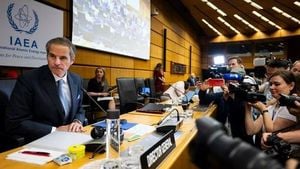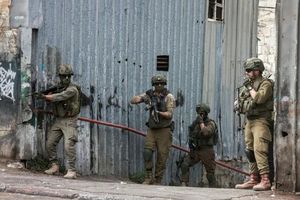In a dramatic turn for the decades-long war on drugs, Ismael "El Mayo" Zambada, the elusive co-founder of Mexico’s notorious Sinaloa Cartel, pleaded guilty on Monday, August 25, 2025, to sweeping federal charges in a Brooklyn, New York, courtroom. The man long considered one of the most powerful and secretive drug lords in the world now faces the prospect of spending the rest of his life behind bars in the United States—a seismic moment for both sides of the border and the global fight against organized crime.
According to The Associated Press, Zambada, 77, admitted in court to leading a continuing criminal enterprise and racketeering conspiracy, capping a career that spanned decades and left deep scars across both the United States and Mexico. In brief but poignant remarks, Zambada acknowledged the devastation his actions had caused. “I recognize the great harm illegal drugs have done to the people in the United States and Mexico,” he said through a Spanish-language interpreter. “I apologize for all of it, and I take responsibility for my actions.”
The guilty plea, which followed a change from his earlier not-guilty stance last September, came after U.S. authorities decided not to seek the death penalty—a move that appears to have catalyzed the agreement, according to Latin Times. Zambada’s sentencing is set for January 13, 2026, and he faces a mandatory minimum of life imprisonment for his role in running the Sinaloa Cartel, one of the most prolific and violent drug trafficking organizations in history.
Federal indictments allege that Zambada and his fellow cartel leaders, including the infamous Joaquin "El Chapo" Guzman, were responsible for flooding the United States with massive quantities of heroin, cocaine, fentanyl, and other illicit drugs. Prosecutors detailed how Zambada employed thousands of operatives across Central and South America, Mexico, and the U.S., not only to traffic drugs but also to enforce cartel discipline through violence. Hitmen on his payroll kidnapped or killed anyone who threatened the cartel’s operations, helping the organization rake in billions of dollars over the years.
Zambada’s arrest in July 2024 at an airfield in El Paso, Texas, followed a joint operation by Homeland Security Investigations and the FBI, as reported by Fox News. It was a coup for U.S. law enforcement, which had pursued him for years as he operated largely in the shadows, even as his partner El Chapo was captured and sentenced to life in a Colorado supermax prison.
Brian Townsend, a retired supervisory special agent with the U.S. Drug Enforcement Administration, told Fox News that Zambada’s confession in court had far-reaching implications. “Zambada admitted in court that for decades he paid off Mexican generals, governors, and politicians,” Townsend said. “These are words directly from the mouth of one of the world’s biggest drug traffickers. It confirms what we have been seeing for decades: Mexico’s institutions have been deeply compromised.”
Zambada himself did not mince words on the subject of corruption. “The organization I led fostered corruption in my home country by paying police, military commanders and politicians who allowed us to operate freely,” he told the court. “It goes back to the very beginning when I was a young man starting out and it continued for all those years.”
Despite the admissions, Mexico’s Secretary of Security and Citizen Protection, Omar García Harfuch, stated on August 27 that the current administration, led by President Claudia Sheinbaum, “has not had any news about bribes paid to officials even though Zambada said he doled them out for decades.” García Harfuch insisted that “no one will be protected,” underscoring the government’s commitment to rooting out corruption, even as the Sinaloa Cartel remains “heavily damaged but not extinct.”
For Sheinbaum, the plea marked a symbolic victory. “When we started, we were told we were chasing shadows,” she said, celebrating what she called the “collapse of the empire” built by Zambada and El Chapo. Yet, as experts pointed out, the cartel’s infrastructure is battered but far from dismantled—a reality that tempers any sense of finality.
The Trump administration, meanwhile, seized on the moment to tout its hardline stance against cartels. Attorney General Pam Bondi declared on August 25, “El Mayo will spend the rest of his life behind bars. He will die in a US federal prison where he belongs. His guilty plea brings us one step closer to achieving our goal of elimination of the drug cartels and the transnational criminal organizations throughout this world that are flooding our country with drugs, human traffickers and homicides.”
Bondi’s comments echoed a broader strategy that has included the designation of groups like Sinaloa and Tren de Aragua as foreign terrorist organizations, a move designed to block their access to the U.S. financial system. In August 2025, the U.S. also struck a deal with Mexico to extradite 26 high-ranking cartel figures, including several with ties to Sinaloa, further ratcheting up pressure on cartel leadership.
However, not everyone believes the plea will translate into a swift end to cartel violence. Nathan Jones, a nonresident scholar in drug policy and Mexico studies at Rice University’s Baker Institute for Public Policy, told Fox News that Zambada’s guilty plea “does place additional pressure on Mexico to comply with U.S. requests,” but warned that any overt U.S. military action on Mexican soil would be seen as a violation of sovereignty. Mexican President Sheinbaum echoed this concern, stating that while Mexico would “collaborate” with the U.S., an “invasion” was out of the question.
Forfeiture of illicit gains is another key aspect of the plea deal. Zambada must surrender $15 billion, a sum that underscores the staggering scale of the cartel’s operations. Yet, Zambada’s attorney, Frank Perez, was quick to clarify that the agreement “is not a cooperation agreement, and I can state categorically that there is no deal under which he is cooperating with the United States Government or any other government,” as reported by ABC News.
Observers note that the U.S. Justice Department’s willingness to spare aging cartel figures like Zambada and Rafael Caro Quintero from the death penalty may reflect a broader prosecutorial strategy: encouraging plea deals to secure convictions and disrupt cartel leadership, even if it means forgoing the possibility of future intelligence from these figures.
As Zambada awaits sentencing, the legacy of his empire continues to cast a long shadow. While officials on both sides of the border celebrate a “crucial victory,” the battered but resilient Sinaloa Cartel remains a potent force. The guilty plea may mark the collapse of one chapter, but the war against organized crime is far from over.




